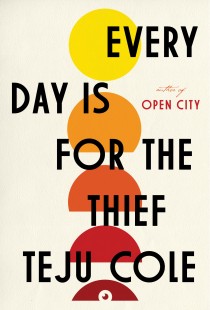 EVERY DAY IS FOR THE THIEF
EVERY DAY IS FOR THE THIEF
By Teju Cole
There’s a moment early in Every Day is for the Thief when the narrator—a Nigerian native who recently returned home for the first time in more than a decade—spies a woman on a Lagos minibus reading a novel by Michael Ondaatje. The sight sparks something in the man, who has been by turns baffled, bewitched and disappointed by his former home. For the first time since his return, he detects a kindred spirit. He feels desperate to approach her, “to say to her,” as Cole writes, “with the wild look common to all those who are crazed by overidentification, ‘We must talk.’ ” Instead, the man watches quietly from the back of the bus as the reader reaches her stop, gets off and walks away.
That scene is one of several to reference Ondaatje in Every Day is for the Thief, Cole’s loosely sketched yet still tremendous first novel. Taken as a whole, the scenes speak to the respect the younger writer has for the Canadian legend, and to the stylistic and thematic debts he owes him. Like Ondaatje, Cole grew up in a former colony and left for the West as a young man. Also like Ondaatje, Cole returned home years later for an extended trip then wrote about it in semi-fictionalized form. In some ways, Every Day is for the Thief is a direct homage to Ondaatje’s Running in the Family. In an early scene, Cole even lifts a description (with attribution) directly from the other book. But in the ways that count, it is something entirely, wonderfully, new.
Originally published in Nigeria in 2007, Every Day is for the Thief is now available in the rest of the world for the first time. For North American audiences, it follows the release of Cole’s second novel, the enormously successful Open City. Told in a series of chronological vignettes, the new (to us) book tracks the narrator’s trip to Lagos, from the time he’s solicited for a bribe in Nigeria’s New York consulate, to the moment he flies out, wracked by malaria, the word “home” sitting in his mouth “like a foreign food.” Most is told in internal monologue and there is no great central conflict. Still, it is a compelling, almost compulsive read. Cole’s eye is so keen and his style so lyrical, it’s nearly impossible not to get lost in his prose.
RICHARD WARNICA